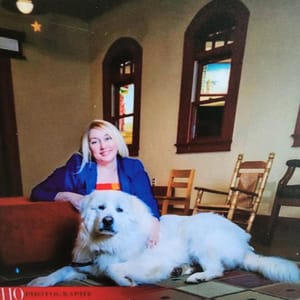What You Should Know about AI as a Marketing Tool
Alexa. Google. Bixby. Siri. The automated voice that directs you when you call a business. Artificial intelligence (AI) is everywhere, and it’s growing. Can it help indie authors market their work? Absolutely! Are there some caveats? Absolutely.
Despite some authors’ hesitations regarding AI use in the creative aspects of their businesses, current programs offer several practical applications for producing promotional material as well. Elizabeth Ann West, Historical Fiction author and communication and education lead for Sudowrite, describes Sudowrite as a “junior writing partner”—the ultimate assistant for an author who is stuck. The application helps with brainstorming, outlining, drafting, and rewriting, and though my hope for an ads-creating-and-managing robot might not exist just yet, there are plenty of other applications for AI in marketing as well.
For example, “Sudowrite has a Tweetstorm feature that can turn any prose into a series of social media posts,” West says. “Other AI tools are building the exact tools you're asking for [ads robot], such as target audience and demographics and even crafting marketing copy and creatives for various audiences. Imagine a marketing world where you don't have to spend money to see if the ad will work; you already have a good idea from the ‘AI readers’ it was tested on.”
Sudowrite isn’t the only AI program with features like those West describes. Jasper.ai promises to “generate months of social media content in minutes,” according to its website. Plus, Jasper can read and write in twenty-six languages, helping you to advertise your books in international markets. Like Sudowrite, Jasper helps brainstorm and is designed to improve your writing, as well as create marketing copy that can translate to sales. Although the application wasn’t designed specifically for authors, the application includes more than fifty built-in templates that could benefit authors, such as content improvement, Facebook Ads copy, marketing angles, and video topic ideas for those marketing on Instagram and TikTok.
Turning a chapter or a scene from your current release into a series of social media posts would be beneficial and time-saving, allowing indie authors to concentrate more on their writing. Help with those dreaded synopses and/or back-cover blurbs would also be wonderful. The social media scheduling platform SocialBee recently rolled out an AI Post Editor Assistant—in beta, at the time of writing—that may be able to do both. According to SocialBee, the application will write and edit social media captions and can summarize blog posts from a URL you provide.
Although it may not be the ads robot of my dreams, Wix has also rolled out an AI application called Facebook Ads by Wix, which uses “advanced computing to analyze data and better understand one’s target customers.” The application doesn’t target authors specifically, but Wix indicates on its blog that the technology is designed to help small businesses “identify the platforms, placements, locations, and audiences your advertising will have the greatest impact on.”
AI has also entered the realm of book market research. "We have been using machine learning in our business for some time," reports Alex Newton, founder of K-lytics.com, a leading market research service for authors and publishers. "We all know that more often than not, the search results and bestseller lists that Amazon presents include books that have little or nothing to do with the genre or type of books you are looking for. Therefore, we started constructing our own Virtual Bestseller Lists in our genre research.”
For example, Newton advises that if a book title or blurb includes the terms "mate," "scorching hot," "blue eyes," "his strong arms," or any other of a growing list of what he calls genre clues, chances are high that the title in question is a Romance. Imagine you run a combination of genre lists and specific filtering criteria against hundreds of thousands of books. At K-lytics, the trick is to have a large quantity of book classification results generated automatically but reviewed manually, i.e., by a human.
“Thus far, AI still cannot beat human judgment,” Newton says. “We had ChatGPT classify a long list of books, but it fell short for at least 15 percent of books."
Marlowe is an application designed for authors by authors. Founded by Matthew Jockers, Alessandra Torre, and J.D. Lasica, Marlowe reads your manuscript and gives you an in-depth report analyzing the plot structure of your novel, your narrative beats, your story’s pacing, your characters’ personality traits, and a comparison of dialogue to narrative writing. Marlowe also flags possible cliches and repetitive phrases, as well as adverb and adjective use. Not only does the application give authors this information, but it also suggests how the data might be helpful to them.
Author and marketing coach Nicholas Erik writes, “AI … can do a lot of stuff better than the current options we have. If I want to write 50 taglines, that would probably take me an hour. Whereas ChatGPT can do that in under a minute. Even if 45 of them are garbage, it's massively more efficient than what I can accomplish on my own. By using AI as a tool, we can come up with turns of phrase, plot points, marketing copy, ad angles, creatives, and other things that would have otherwise never have crossed our minds. Thus allowing us to increase the level of our marketing and writing craft at a truly breakneck pace.” Erik explains that he doesn’t think authors will be replaced but instead “augmented” by AI, so long as they can adapt to the tools effectively.
Writer Beware
Of course, AI programs like these also pose ethical concerns in some circles that may counteract the help they can provide. ChatGPT is one of the more popular AI apps that has received a lot of attention lately, and not always for good reason. Released on November 30, 2022, by OpenAI, ChatGPT can act as a virtual assistant for writers. I tested this theory myself in getting suggestions for taglines and back-cover blurbs for my work-in-progress as well as wording for a newsletter. I was pleased with the output and able to make a few tweaks and have the work done much quicker than I normally would have.
I was surprised, however, when my protagonist’s surname was generated in one of the back-cover blurbs when I’d only told ChatGPT the character’s first name and the name of the series. I asked the chatbot how it knew my protagonist’s last name, and it basically responded that it was a coincidence. I wasn’t so sure.
On its website, Authors Guild reports that the organization “has been actively engaged in legal and policy discussions surrounding AI and copyright.” Because of concerns about data mining for use in training AI models, Authors Guild has also updated its Model Trade Book Contract and its Literary Translation Model Contract to include additional clauses that prohibit publishers from using or sub-licensing books under contract for this purpose.
Many independent creatives, such as authors, audiobook narrators, illustrators, and editors, are concerned with being replaced by AI technology. However, though AI audiobook narration is getting better all the time, many others argue against its ability to replace a voice actor breathing life into an author’s characters. Still, is there a place for both in the industry?
When I asked West about the issue, she said, “I think there's going to be some pain in the industry, but in the end, the AI-generated audio content and other content will … be a good thing. More readers of niche genres will have audiobooks that might not be a project any publisher or narrator could invest time and resources into producing. With more platforms like TikTok and YouTube becoming the place that readers and listeners consume content, AI-generated narration will allow a content creator, like a writer or other artist, to bring their projects to the audience without having to have a large bankroll to do so.”
West says the best way to market a book is to write another book, and many independent authors would likely agree with her sentiment. While AI can certainly help with writing that book, it’s the author’s responsibility to do so ethically and wisely. Still, if you’re like me and can use all the marketing help you can get, you might want to learn about the AI applications available—at the very least to assist you in reaching your target audience.


